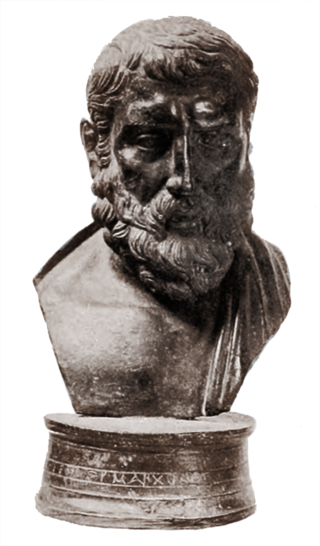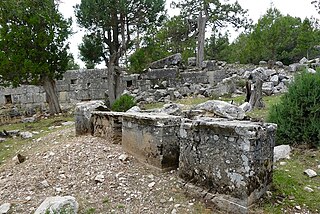Related Research Articles

Epicurus was an ancient Greek philosopher and sage who founded Epicureanism, a highly influential school of philosophy. He was born on the Greek island of Samos to Athenian parents. Influenced by Democritus, Aristippus, Pyrrho, and possibly the Cynics, he turned against the Platonism of his day and established his own school, known as "the Garden", in Athens. Epicurus and his followers were known for eating simple meals and discussing a wide range of philosophical subjects. He openly allowed women and slaves to join the school as a matter of policy. Of the over 300 works said to have been written by Epicurus about various subjects, the vast majority have been destroyed. Only three letters written by him—the letters to Menoeceus, Pythocles, and Herodotus—and two collections of quotes—the Principal Doctrines and the Vatican Sayings—have survived intact, along with a few fragments of his other writings. As a result of his work's destruction, most knowledge about his philosophy is due to later authors, particularly the biographer Diogenes Laërtius, the Epicurean Roman poet Lucretius and the Epicurean philosopher Philodemus, as well as the hostile but largely accurate accounts by the Pyrrhonist philosopher Sextus Empiricus, and the Academic Skeptic and statesman Cicero.

Epicureanism is a system of philosophy founded around 307 BCE based upon the teachings of Epicurus, an ancient Greek philosopher. Epicurus was an atomist and materialist, following in the steps of Democritus. His materialism led him to religious skepticism and a general attack on superstition and divine intervention. Originally a challenge to Platonism, its main opponent later became Stoicism. Although Epicureanism is a form of hedonism insofar as it declares pleasure to be its sole intrinsic goal, the concept that the absence of pain and fear constitutes the greatest pleasure, and its advocacy of a simple life, make it very different from hedonism as colloquially understood. Following the Cyrenaic philosopher Aristippus, Epicurus believed that the greatest good was to seek modest, sustainable pleasure in the form of a state of ataraxia and aponia through knowledge of the workings of the world and limiting desires. Correspondingly, Epicurus and his followers generally withdrew from politics because it could lead to frustrations and ambitions that would conflict with their pursuit of virtue and peace of mind.
Diogenes Laërtius was a biographer of the Greek philosophers. Little is definitively known about his life, but his surviving Lives and Opinions of Eminent Philosophers is a principal source for the history of ancient Greek philosophy. His reputation is controversial among scholars because he often repeats information from his sources without critically evaluating it. He also frequently focuses on trivial or insignificant details of his subjects' lives while ignoring important details of their philosophical teachings and he sometimes fails to distinguish between earlier and later teachings of specific philosophical schools. However, unlike many other ancient secondary sources, Diogenes Laërtius generally reports philosophical teachings without attempting to reinterpret or expand on them, which means his accounts are often closer to the primary sources. Due to the loss of so many of the primary sources on which Diogenes relied, his work has become the foremost surviving source on the history of Greek philosophy.
John of Salisbury, who described himself as Johannes Parvus, was an English author, philosopher, educationalist, diplomat and bishop of Chartres.

Pierre Gassendi was a French philosopher, Catholic priest, astronomer, and mathematician. While he held a church position in south-east France, he also spent much time in Paris, where he was a leader of a group of free-thinking intellectuals. He was also an active observational scientist, publishing the first data on the transit of Mercury in 1631. The lunar crater Gassendi is named after him.
Hedone is the Greek word meaning "pleasure." It was an important concept in Ancient Greek philosophy, especially in the Epicurean school. It is also the root of the English word "hedonism".

Metrodorus of Lampsacus was a Greek philosopher of the Epicurean school. Although one of the four major proponents of Epicureanism, only fragments of his works remain. A Metrodorus bust was found in Velia, slightly different modeled to depict Parmenides.

Hermarchus or Hermarch, sometimes incorrectly written Hermachus, was an Epicurean philosopher. He was the disciple and successor of Epicurus as head of the school. None of his writings survives. He wrote works directed against Plato, Aristotle, and Empedocles. A fragment from his Against Empedocles, preserved by Porphyry, discusses the need for law in society. His views on the nature of the gods are quoted by Philodemus.
Philodemus of Gadara was an Epicurean philosopher and poet. He studied under Zeno of Sidon in Athens, before moving to Rome, and then to Herculaneum. He was once known chiefly for his poetry preserved in the Greek Anthology, but since the 18th century, many writings of his have been discovered among the charred papyrus rolls at the Villa of the Papyri at Herculaneum. The task of excavating and deciphering these rolls is difficult, and work continues to this day. The works of Philodemus so far discovered include writings on ethics, theology, rhetoric, music, poetry, and the history of various philosophical schools. Ethel Ross Barker suggested in 1908 that he was owner of the Villa of the Papyri Library.

Doxa is a common belief or popular opinion. In classical rhetoric, doxa is contrasted with episteme ('knowledge').

Angela Hunter "Angie" Hobbs is a British philosopher and academic, who specialises in Ancient Greek philosophy and ethics. She is Professor of the Public Understanding of Philosophy at the University of Sheffield.
Atomism is a natural philosophy proposing that the physical universe is composed of fundamental indivisible components known as atoms.

Diogenes of Oenoanda was an Epicurean Greek from the 2nd century AD who carved a summary of the philosophy of Epicurus onto a portico wall in the ancient Greek city of Oenoanda in Lycia. The surviving fragments of the wall, originally extended about 80 meters, form an important source of Epicurean philosophy. The inscription, written in Greek, sets out Epicurus' teachings on physics, epistemology, and ethics. It was originally about 25,000 words long and filled 260 square meters of wall space. Less than a third of it has been recovered.
Hellenistic philosophy is Ancient Greek philosophy corresponding to the Hellenistic period in Ancient Greece, from the death of Alexander the Great in 323 BC to the Battle of Actium in 31 BC. The dominant schools of this period were the Stoics, the Epicureans and the Skeptics.
Polystratus ; died 219/18 BCE) was an Epicurean philosopher, and head (scholarch) of the Epicurean school in Athens. He succeeded Hermarchus as head of the sect c. 250 BC, and was himself succeeded by Dionysius of Lamptrai when he died 219 or 218 BC. Valerius Maximus relates that Polystratus and Hippoclides were born on the same day, followed the sect of the same master Epicurus, shared their patrimony in common, and supported the school together, and at last died at the same moment in extreme old age.
David Neil Sedley FBA is a British philosopher and historian of philosophy. He was the seventh Laurence Professor of Ancient Philosophy at Cambridge University.
Robert Pogue Harrison is a professor of literature at Stanford University, where he is Rosina Pierotti Professor in Italian Literature in the Department of French & Italian.
Anthony Arthur Long FBA is a British-American classical scholar who is the Chancellor's Professor Emeritus of Classics, Irving Stone Professor of Literature Emeritus, and Affiliated Professor of Philosophy and Rhetoric at the University of California, Berkeley.
Gretchen Reydams-Schils is Professor in the Program of Liberal Studies at the University of Notre Dame, and holds concurrent appointments in Classics, Philosophy, and Theology. She is a specialist in Plato and the traditions of Platonism and Stoicism.

Emily Joanna Gowers, is a British classical scholar. She is Professor of Latin Literature at the University of Cambridge and a Fellow of St John's College, Cambridge. She is an expert on Horace, Augustan literature, and the history of food in the Roman world.
References
- ↑ "Andrea Nightingale Stanford Page". Archived from the original on 2013-11-11. Retrieved 2013-11-11.
- ↑ "Epicurus and Epicureanism," "Plato and Love and Beauty," "Moby Dick," archived on the website for the Department of French and Italian, Stanford University